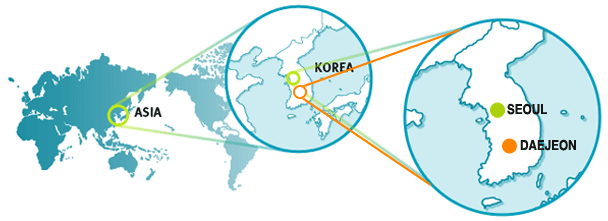|
|
 |
 |
 Home > General Information > About Korea Home > General Information > About Korea |
 |
 |
Korea, traditionally known as the Land of the Morning Calm, is today a modern, bustling hub of East Asia. It is a peninsula jutting off of China, and Japan is only two hours away. Despite this close physical proximity to the neighboring countries, Korea has a distinctive culture of its own, which has developed during its 5,000 years of history. Visitors can expect to meet a lively population with its own language, writing system, architecture, cuisine, and many other manifestations of a unique cultural heritage. |
 |
 |
|
The capital of South Korea is Seoul. Seoul has been the capital city of Korea since 1392. This city is the heart of the Republic of Korea, home to 10 million of the nation's 48 million people. Seoul is located in the central region of the Korean Peninsula. Seoul is the center of finance, politics, commerce, recreation, education and culture, and is home to major corporations, banks, government offices, schools, theaters, and entertainment facilities. The wide and beautiful Han river (Hangang) flows through Seoul and serves as a lifeline for the heavily concentrated population. There are rich and satisfying variety of things to see and do for residents and visitors aliked. |
 |
 |
 |
|
Daejeon Metropolitan City is a center of knowledge and information, situated at the center of the Korean Peninsula. Daejeon is easily accessible from any place in Korea as it is the hub of national transportation, linking the whole country from east to west, and from north to south. It is an important place where traffic diverges into two major expressways, the Gyungbu Expressway going to the east and the Honam Expressway to the west.
The science festival, the largest-scale ever in Korea, is to be held at the Expo park in Daejeon. The international exposition (Expo '93) at Daejeon created the Hanbit Tower and the Expo Bridge.
Daejeon is home to Daedeok Valley, a cradle for high-tech industry, where Daedeok Science Town, the best R&D park in Korea, is located. Daedeok Science Town is home to around 70 research institutes, including Korea Research Institute of Standards and Science (KRISS). As the home to world-class research institutes that are focused on fundamental science, information technology, biotechnology, nanotechnology, and space technology, Daejeon offers a highly favorable environment for the successful exchange of knowledge, close cooperation, and innovative research results. |
 |
 |
Korea's climate is regarded as a continental climate from a temperate standpoint and a monsoon climate from a precipitation standpoint. The climate of Korea is characterized by four distinct seasons. Spring and autumn are rather short, summer is hot and humid, and winter is cold and dry with abundant snowfall. Temperatures differ widely from region to region within Korea, with the average being between 6 °C (43°F) and 16 °C (61°F). The average temperature in August (in the middle of summer), ranges from 25°C to 28°C. |
| < Monthly Temperature > |
| Month |
Jan. |
Feb. |
Mar. |
Apr. |
May. |
Jun. |
Jul. |
Aug. |
Sep. |
Oct. |
Nov. |
Dec. |
| Temperature |
-4 |
0 |
5 |
12 |
17 |
22 |
26 |
28 |
17 |
10 |
0 |
-4 |
|
 |
 |
Basic unit of Korean currency is won. The exchange rate is subject to change with minor daily fluctuation. As of March 18, 2009, the exchange rate is approximately US$1 to KR ₩1,421. Foreign bank notes and traveler's checks can be exchanged into Korean Won at the airport, hotels and at all Korean banks. Credit Cards, e. g. VISA, MasterCard, American Express and Diners Club, are all widely accepted. |
 |
 |
|
Hangeul was invented in 1443, during the reign of King Sejong. It is composed of 10 vowels and 14 consonants. Hangeul has 11 compound vowels, 5 glottal sounds. The chart below represents the 24 Hangeul letters and their romanized equivalents. 'The Hunminjeongeum,' a historical document which provides instructions to educate people using Hangeul, is registered with UNESCO. UNESCO awards a 'King Sejong Literacy Prize, ' every year in memory of the inventor of Hangeul. |
| English |
Korean |
Korean Pronunciation |
| How are you? |
안녕하세요? |
Aan-nyeong-haseyo? |
| Thank you. |
감사합니다. |
Gamsa-haam-nida. |
| Yes. |
예. |
Ye. |
| No. |
아니요. |
Aniyo. |
| I am sorry. |
미안합니다. |
Meean-hamnida. |
| I enjoyed the meal. |
잘 먹었습니다. |
Jal mugut-sum-nida. |
| Please give me some more of this. |
이것 더 주세요. |
Yigut du juseyo. |
| The check, please. |
계산서 주세요. |
Gye-saanseo juseyo. |
| Do you take credit cards? |
카드로 계산할 수 있습니까? |
Card-ro gyesaan halsu |
| How much is it? |
얼마입니까? |
yisum-neeka? |
| It is ________ won. |
_________ 원 입니다. |
Ulma-eem-neeka? |
| _________ won eem-needa. |
| 5,000 |
오천 |
O-cheon |
| 10,000 |
만 |
Maan |
| 15,000 |
만오천 |
Maan-o-cheon |
| 20,000 |
이만 |
Yi-maan |
| 30,000 |
삼만 |
Saam-maan |
| Where is the rest room ? |
화장실 어디입니까? |
Hwa-jangsil udee-eem-nee ka?? |
| Goodbye. |
안녕히 계세요. |
Aan-nyeonghee gyeseyo |
|
|
 |
 |
|
|